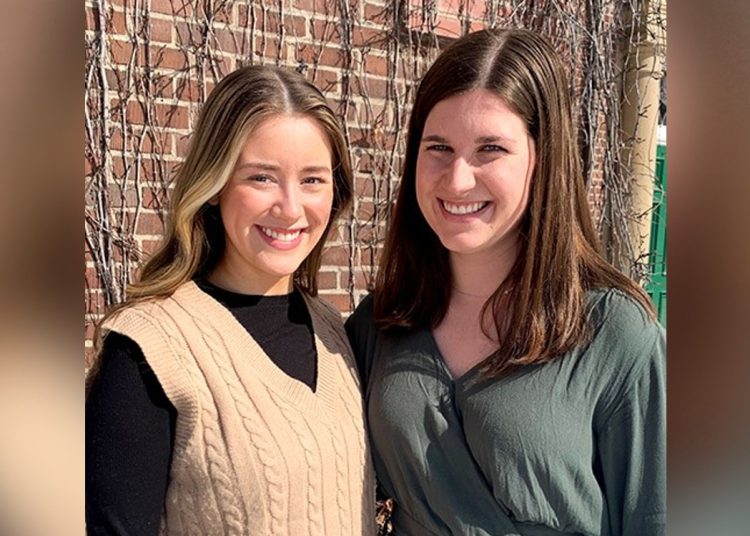Last year, fifth-year University of New Brunswick student Caroline Stephen was in the Harriet Irving Library when her period unexpectedly started. She searched the library washrooms for menstrual product dispensers to no avail, compelling a trek to the campus pharmacy for an expensive full-pack tampon purchase. Startled by the unforeseen hassle, she was instilled with the belief that free menstrual products should accompany buildings regularly frequented by menstruating students.
“That situation got me thinking ‘what the heck, why are period products so inaccessible in such a commonly-used student building?’” says Stephen. “I started reaching out to stakeholders within the university to get a sense of what could be done.”
She shared her vision with second-year UNB student Kate Palmer, who ran for the position of Student Union Women’s Councillor to adopt the initiative as her official project. Financial support began to flow from those in leadership positions.
“We got to the right people in the university and had a meeting with them. They felt it was a great pilot project, (and) saw potential in it being successful,” says Stephen.
Stephen and Palmer quickly found themselves with a pool of resources — 15 menstrual product dispensers to be installed in campus buildings and sanitary products from the UNB Health Center. They amassed a group of 54 volunteers to manage the donations, culminating in the establishment of the UNB Menstrual Health Society.
Now, the Society has grown to over a hundred members, formed community partnerships, embarked on giving talks to schools about menstrual products and period stigma, and won a prestigious award from the Government of New Brunswick. Stats on period product usage show that nearly six thousand products have been used by students so far.
Palmer discusses the Society’s feats and how her understandings of period stigma have deepened.
She explains that membership has extended from UNB students to community volunteers who sustain the Society. Some volunteers ensure that the period product dispensers on campus are filled on a weekly basis, while others take on initiatives that are communicated on the Society’s online platform throughout the year. The executive team plans initiatives biweekly and meets with the full Society each semester to provide updates.
“It’s hard to say the set number (of volunteers), but we have so many and that’s what kind of keeps it afloat,” says Palmer. “When you finally get in contact with the right people and get people talking about (the Society), it becomes this whole community.”
The Society has established partnerships with the Fredericton Downtown Community Health Centre, Liberty Lane, Grace House, and the Multicultural Association of Fredericton, expanding the Society’s reach and allowing it to function as a charity. Community events have been held to collect funds, hygiene products, and other necessities for these organizations.
The partnerships also helped build cross-cultural understandings of period stigma. Palmer shares that the Society set up a booth about menstrual products at a fair held by the Multicultural Association of Fredericton; she learned that some communities who were new to Canada weren’t familiar with period products, their costs, or discussions around menstruation. For Palmer, these experiences showed how varied stigmatization can be.
“The comment that kept coming up was “you’re just talking about (menstruation), you have a society about this?” It just reinforced how different and how stigmatized it is,” says Palmer. “In a lot of different cultures you can’t go out and buy products, you have to find your own way to handle it… we were talking about different prices of products, and just kind of talking about it (generally). And you could tell how much they appreciated it, and how much of a happy surprise it was.”
Understandings of period stigma were built by speaking at schools about menstruation, too. Palmer shares that the Society visited École Sainte Anne, Devon Middle School, and Nashwaaksis Middle School to give talks on what a period is, the inaccessibility of period products, and how menstruation is stigmatized. The goal was to shed light on aspects of menstruation that, according to Palmer, are not taught in schools.
“Every presentation is completely different. It’s not as much like teaching as much as it is feeding off their energy and seeing what they need more of or less of to make sure everyone really gets the same understanding,” says Palmer. “I think we made it a really comfortable environment for questions to be asked.”
The students ranged from grade 6 to grade 9. She says the talks given to grade 9 students at École Sainte Anne were “very interactive.” Talks to grade 8 students at Devon Middle school were marked by an equal amount of questions from male and female students, with Palmer sharing that some boys were hearing about what a period was for the first time. The grade 6 students at Nashwaaksis Middle School would just “burst out” with questions, their eyes widening and their faces lighting up.
“There were just amazing questions because… it showed how much they were missing from school and from knowledge,” says Palmer. “You can kind of see the impact there, which was awesome.”
On March 8th — International Women’s Day — the Government of New Brunswick presented Kate Palmer and Caroline Stephen with the 2023 Youth Champions VIVE Awards for the Minister’s Award for Excellence in Championing Gender Equality. They had applied for the award around Christmas time, detailing the Society’s goals, achievements, and how rapidly membership is growing.
“(The award) is really, really exciting,” says Palmer. “It will be great — it will almost increase our credibility.”
Incé Husain is a fourth-year UNB psychology student and student journalist who has written for The Aquinian, The Brunswickan, The Atlantic Student Research Journal, and pursues local stories independently.








![Interview with Anita Joseph, winner of the New Brunswick Human Rights award [video]](https://nbmediacoop.org/wp-content/uploads/2025/11/AnitaJoseph-2-120x86.jpg)

